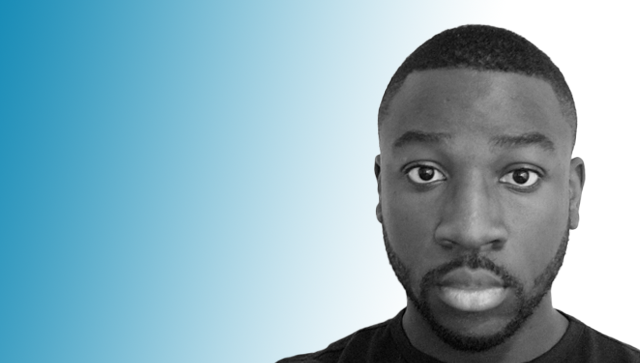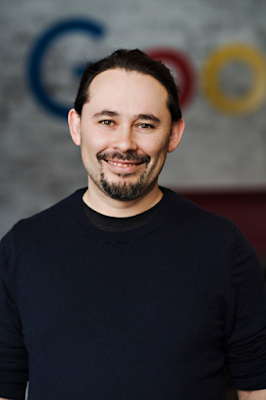Vincent Anioke is proving that you can do more than one thing you love (at the same time) and be exceptional at all of them. By day, he’s a Software Engineer at Google Waterloo, and night, a writer. Inspired by his father’s library in Nigeria, Vincent immediately fell in love with the power of words and has been using them to motivate others ever since.
Although his path to a career in technology wasn’t always one he knew he’d pursue, his love for mathematical problems and puzzles led him to discover the world of computer science. And today, he’s passionate about paying it forward and inspiring other Black+ professionals, crediting his path in technology and time at Google to the power of seeing yourself represented.
How would you describe your job at a dinner party to people who don't work in tech?
I usually start by telling people that I work on the Gmail team since it’s something that most people are familiar with! The work I do specifically focuses on features that enhance the efficiency, productivity, and accessibility for all Gmail users which can range from individuals to small business owners to corporate employees.
Is there a particular Gmail project that you are proud to have worked on?
Absolutely! I was really fortunate to have worked on Gmail Offline — a feature that provides consumers the ability to read, respond to, and search your Gmail messages even when you aren't connected to the Internet.
Personally, I’m proud of working on this because it helps make email more accessible. For example, in my home country of Nigeria, there are many people in rural locations who have very low or sometimes no internet access at all, so this feature allows them to still use their Gmail despite this.
What's the most challenging part of your job?
I find that the initial few weeks of diving into a new project can be challenging. There are so many unknowns and complexities — some of which take months to untangle! It is like stumbling around an intricate maze on a starless night. But by diving deeper into relevant (and often enormous) codebases, reading through design docs, prototyping potential solutions, and working with engineers across other teams, I start to get a picture of what the solution should look like — which is really exciting and rewarding.
What's the most rewarding part of your job?
It’s funny, I have this memory from when I was 7 years old, where I would lay on the floor in my bedroom and solve number puzzles. I really loved puzzles, and the harder they were the better. Today, the puzzles look a little different — there are multitudes of breakthroughs that happen in my role. Whether it's successfully getting a stubborn piece of code to run, resolving a bug, or brainstorming with a coworker on a tricky problem, working at Google means reckoning with technological roadblocks of all different sizes on a regular basis — but there's this release of euphoria that goes off each time a roadblock is navigated. I find this constant tango of question and answer very rewarding. I’ve always liked mathematics and problem solving, and Google presents you with so many fun puzzles to solve — that child who loved solving puzzles is still very much inside me.
Was there something specific that pushed you toward your career in tech?
Definitely! There was actually a series of moments that inspired my career path. I attended the Massachusetts Institute of Technology (MIT) for mathematics, but out of curiosity I took a computer science elective called Intro to Python. In the first month, we made an interactive game of Hangman that blew my mind. I had this moment where I realized: wow, if this was the product of a few weeks, how much could I learn in a few years? This was supposed to be a one semester exercise, but then it changed my life and eventually became my career.
Another pivotal moment for me was when a Black Google employee came to campus to give a talk about his own path. I had no idea that a career in tech could be possible, so seeing someone like me working at a company I once deemed unreachable was what convinced me to apply for an internship. It also showed me the inexorable power of visibility.
And lastly, my internship at Google! I was fortunate to do two internships at Google, but my first was so deeply rewarding that I knew I wanted to pursue this line of work for years to come. It was like discovering Narnia. Some days, the height of technology's output still feels like magic!
What’s your one secret power/habit that makes you successful?
Knowing when to ask for help. There was a time when I was convinced that being a software engineer at Google meant grappling with difficulty until I lone-wolfed the answers into existence — that asking for help was a red flag. Since then, I've come to understand that it's normal and even expected, that by reaching out to the right experts (and Googlers are usually very responsive), I significantly improve my productivity and learn a few new things in the process.
What's something about you that would surprise people?
Since I was a kid I’ve always written voraciously in my free time. Back in Nigeria, my dad had a huge library of books, which inspired me to work on writing my own novel. These days, my focus is writing short stories for publication in literary magazines. The stories are usually melancholy and introspective in nature, and are usually set in my home country of Nigeria. I've also been shortlisted and longlisted for a few literature prizes. Tech and the arts are often situated as oppositional, so I think my deep and abiding love of writing might surprise people. You can keep up with my stories on my Twitter.
What advice would you give to Black+ people pursuing a career in technology?
The advice that I would give is actually advice I've personally received in my life, which is that there are way more people than I realize who struggle with imposter syndrome. Essentially feeling like they aren't good enough or being exposed as a fraud. It’s important to recognize that this feeling is common, and that it cannot stop you from trying your best, or your hardest. Oftentimes, you'll be surprised by just how much you can accomplish with perseverance. Discipline will always trump any reliance on innate talent.
What inspires you in your career?
There are definitely a few people that come to mind — my co-workers, my mom, my first manager in Canada and Taylor Swift.
I am consistently astonished by my coworkers’ intellect, drive and humility. I find surprises in the depth of their passions too and I’m fortunate enough to work with talented, well-rounded individuals. They inspire me in my career and also in my personal life.
My mom is very inspirational to me. She grew up in a village in Nigeria, and worked really hard to make a name for herself, and give me and my siblings an amazing life. Her love and sacrifice was a true act of selfless love. She gave everything for us.
My first manager in Canada, Ryan, made a huge impression on me. When I joined Google Canada he really helped me learn the ropes. I suffered from imposter syndrome and he really made me feel like I was capable and did belong here.
And I know it sounds really weird (and all my friends make fun of me for this!) but Taylor Swift is a big inspiration to me. She’s an incredible example of someone that’s at the top of their game. She started writing at 13, continues to work on her craft, and has an incredible work ethic.
How do you hope to inspire the next generation of Black+ boys and girls as they start to explore their interests?
I hope to be a good example of a Black man and Black engineer. Through the work that I do, I want to show Black students that they can have a future in the career that they choose to pursue.The reason I am at Google is because someone came to campus and inspired me to apply. I understand the power of representation and I’m still really involved in campus outreach to show Black young students that they can have a career in tech.
I also want to inspire others through my writing. I use my writing to speak out about my experiences as a Black man in a country that is mostly white, and what it is like to be an immigrant. Essentially, I write stories around identity and the different layers of my humanity.
The past year has shown how resilient we are — how are you continuing to rise?
I feel very lucky and very privileged to be where I am in 2021. I have a job I love, a home, safe family and friends, while many people are struggling and have lost so much. I think this sense of privilege makes me want to make the most of it, and this is really a driving force for me. I also work really hard at maintaining my work/life balance. Part of what keeps me sane and grounded is my writing — so I always make time for that.



